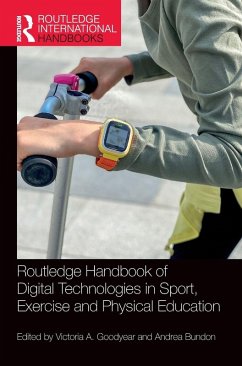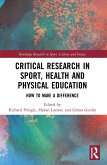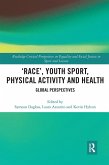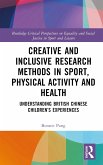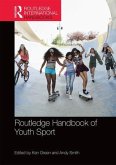Routledge Handbook of Digital Technologies in Sport, Exercise and Physical Education
Herausgeber: Goodyear, Victoria A.; Bundon, Andrea
Routledge Handbook of Digital Technologies in Sport, Exercise and Physical Education
Herausgeber: Goodyear, Victoria A.; Bundon, Andrea
- Gebundenes Buch
- Merkliste
- Auf die Merkliste
- Bewerten Bewerten
- Teilen
- Produkt teilen
- Produkterinnerung
- Produkterinnerung
This is the first book to offer in-depth analysis of the use of digital technologies in sport, exercise and physical education; their significance for the relationship between sport, exercise and wider society; and their impact on research in sport, exercise and physical education.
Andere Kunden interessierten sich auch für
![Routledge Handbook of Physical Education Pedagogies Routledge Handbook of Physical Education Pedagogies]() Routledge Handbook of Physical Education Pedagogies305,99 €
Routledge Handbook of Physical Education Pedagogies305,99 €![Defining Physical Education (Routledge Revivals) Defining Physical Education (Routledge Revivals)]() David KirkDefining Physical Education (Routledge Revivals)57,99 €
David KirkDefining Physical Education (Routledge Revivals)57,99 €![Critical Research in Sport, Health and Physical Education Critical Research in Sport, Health and Physical Education]() Critical Research in Sport, Health and Physical Education55,99 €
Critical Research in Sport, Health and Physical Education55,99 €![Defining Physical Education (Routledge Revivals) Defining Physical Education (Routledge Revivals)]() David KirkDefining Physical Education (Routledge Revivals)194,99 €
David KirkDefining Physical Education (Routledge Revivals)194,99 €!['Race', Youth Sport, Physical Activity and Health 'Race', Youth Sport, Physical Activity and Health]() 'Race', Youth Sport, Physical Activity and Health54,99 €
'Race', Youth Sport, Physical Activity and Health54,99 €![Creative and Inclusive Research Methods in Sport, Physical Activity and Health Creative and Inclusive Research Methods in Sport, Physical Activity and Health]() Bonnie PangCreative and Inclusive Research Methods in Sport, Physical Activity and Health165,99 €
Bonnie PangCreative and Inclusive Research Methods in Sport, Physical Activity and Health165,99 €![Routledge Handbook of Youth Sport Routledge Handbook of Youth Sport]() Routledge Handbook of Youth Sport265,99 €
Routledge Handbook of Youth Sport265,99 €-
-
-
This is the first book to offer in-depth analysis of the use of digital technologies in sport, exercise and physical education; their significance for the relationship between sport, exercise and wider society; and their impact on research in sport, exercise and physical education.
Produktdetails
- Produktdetails
- Verlag: Routledge
- Seitenzahl: 476
- Erscheinungstermin: 11. November 2025
- Englisch
- Abmessung: 250mm x 175mm x 30mm
- Gewicht: 994g
- ISBN-13: 9781032533797
- ISBN-10: 103253379X
- Artikelnr.: 74172491
- Herstellerkennzeichnung
- Libri GmbH
- Europaallee 1
- 36244 Bad Hersfeld
- gpsr@libri.de
- Verlag: Routledge
- Seitenzahl: 476
- Erscheinungstermin: 11. November 2025
- Englisch
- Abmessung: 250mm x 175mm x 30mm
- Gewicht: 994g
- ISBN-13: 9781032533797
- ISBN-10: 103253379X
- Artikelnr.: 74172491
- Herstellerkennzeichnung
- Libri GmbH
- Europaallee 1
- 36244 Bad Hersfeld
- gpsr@libri.de
Victoria A. Goodyear is Professor of Physical Activity, Health and Well-being in the School of Sport, Exercise and Rehabilitation Sciences and the Institute for Mental Health, University of Birmingham, UK. Andrea Bundon is Associate Professor in the School of Kinesiology and Principal Investigator at the International Collaboration on Repair Discoveries (ICORD) at the University of British Columbia, Canada.
1.Digital Technologies in Sport, Exercise and Physical Education: A Social
Science Qualitative Perspective. Part I - Emerging Issues.
2.Conceptualising Active Bodies in Digital Spaces: A Feminist Relational
Approach. 3.Screens, health, and sedentary lifestyles: The need to
recognise complexity, function, and context. 4.Digital Media Technologies
in Sport Media: Issues in Media Production, Representation, and
Consumption. 5.Navigating issues of privacy when conducting social media
research in sport and exercise: Notes from the field. 6.Utilizing
Technology in Physical Education: Are teachers prepared, willing, and
ready? Part II - Theoretical and Methodological Approaches. 7.Learning
theory and digital technology in sport, exercise, and physical education.
8.What do different theories do in researching health-related public
pedagogies on digital technologies? 9.Exercising power through digital data
in elite sport. 10.Narrative Inquiry: Exploring the Value of Big and Small
Stories from Motherhood and Sport Research in the Digital Landscape.
11.Doing digital knowledge translation and implementation science in sport
and physical activity. 12.Measurement of quantity and quality of physical
activity within school-settings. 13.Ethnography online: Researching sport
and physical activity cultures on social media. Part III - Praxis.
14.Digital Technology in Physical Education: An Entangled Pedagogy
Perspective. 15.Technology-enhanced learning in coaching: Contemporary
issues and future developments. 16.Postdigital learning: An ecology for
teacher/coach professional development. 17.Beyond making students busy and
happy: Exploring the potential of digital games in physical education
classes. 18.Connection, communication, and community: Reflections on the
technological affordances of Instagram in the lives of sport participants.
Part IV - Future Visions. 19.Understanding gender-based violence in online
sporting spaces: Considerations for keeping safe in the digital realm.
20.Working with Indigenous Data: Contexts, Relevance, and Ethics.
21.Generative artificial intelligence and visual qualitative methods.
22.Building the case for Planet-Centric Health and Physical Education for
Society 6.0. 23.Research ethics and digital platforms: Finding firm ground
in shifting worlds. Part V - Emerging Research. 24.From research to
practice: Safeguarding athletes in online environments. 25.Digital health
technology for delivering and monitoring exercise programmes in clinical
populations. 26.Using technology to inform explicit coaching of values and
life skills in sport and physical education lessons. 27.How do digitised
sporting metrics feel? The affective experiences of women Australian Rules
footballers. 28.Video and digital technologies as tools for participatory
inclusive physical education and school sport research. 29.Tracing the
swim: Spatial video as a tool for in-aqua research. 30.The use of digital
media in physical education: A sport pedagogical and media pedagogical
challenge? 31.Digital inclusion: How technology supports physical activity
of people with mobility impairments.
Science Qualitative Perspective. Part I - Emerging Issues.
2.Conceptualising Active Bodies in Digital Spaces: A Feminist Relational
Approach. 3.Screens, health, and sedentary lifestyles: The need to
recognise complexity, function, and context. 4.Digital Media Technologies
in Sport Media: Issues in Media Production, Representation, and
Consumption. 5.Navigating issues of privacy when conducting social media
research in sport and exercise: Notes from the field. 6.Utilizing
Technology in Physical Education: Are teachers prepared, willing, and
ready? Part II - Theoretical and Methodological Approaches. 7.Learning
theory and digital technology in sport, exercise, and physical education.
8.What do different theories do in researching health-related public
pedagogies on digital technologies? 9.Exercising power through digital data
in elite sport. 10.Narrative Inquiry: Exploring the Value of Big and Small
Stories from Motherhood and Sport Research in the Digital Landscape.
11.Doing digital knowledge translation and implementation science in sport
and physical activity. 12.Measurement of quantity and quality of physical
activity within school-settings. 13.Ethnography online: Researching sport
and physical activity cultures on social media. Part III - Praxis.
14.Digital Technology in Physical Education: An Entangled Pedagogy
Perspective. 15.Technology-enhanced learning in coaching: Contemporary
issues and future developments. 16.Postdigital learning: An ecology for
teacher/coach professional development. 17.Beyond making students busy and
happy: Exploring the potential of digital games in physical education
classes. 18.Connection, communication, and community: Reflections on the
technological affordances of Instagram in the lives of sport participants.
Part IV - Future Visions. 19.Understanding gender-based violence in online
sporting spaces: Considerations for keeping safe in the digital realm.
20.Working with Indigenous Data: Contexts, Relevance, and Ethics.
21.Generative artificial intelligence and visual qualitative methods.
22.Building the case for Planet-Centric Health and Physical Education for
Society 6.0. 23.Research ethics and digital platforms: Finding firm ground
in shifting worlds. Part V - Emerging Research. 24.From research to
practice: Safeguarding athletes in online environments. 25.Digital health
technology for delivering and monitoring exercise programmes in clinical
populations. 26.Using technology to inform explicit coaching of values and
life skills in sport and physical education lessons. 27.How do digitised
sporting metrics feel? The affective experiences of women Australian Rules
footballers. 28.Video and digital technologies as tools for participatory
inclusive physical education and school sport research. 29.Tracing the
swim: Spatial video as a tool for in-aqua research. 30.The use of digital
media in physical education: A sport pedagogical and media pedagogical
challenge? 31.Digital inclusion: How technology supports physical activity
of people with mobility impairments.
1.Digital Technologies in Sport, Exercise and Physical Education: A Social
Science Qualitative Perspective. Part I - Emerging Issues.
2.Conceptualising Active Bodies in Digital Spaces: A Feminist Relational
Approach. 3.Screens, health, and sedentary lifestyles: The need to
recognise complexity, function, and context. 4.Digital Media Technologies
in Sport Media: Issues in Media Production, Representation, and
Consumption. 5.Navigating issues of privacy when conducting social media
research in sport and exercise: Notes from the field. 6.Utilizing
Technology in Physical Education: Are teachers prepared, willing, and
ready? Part II - Theoretical and Methodological Approaches. 7.Learning
theory and digital technology in sport, exercise, and physical education.
8.What do different theories do in researching health-related public
pedagogies on digital technologies? 9.Exercising power through digital data
in elite sport. 10.Narrative Inquiry: Exploring the Value of Big and Small
Stories from Motherhood and Sport Research in the Digital Landscape.
11.Doing digital knowledge translation and implementation science in sport
and physical activity. 12.Measurement of quantity and quality of physical
activity within school-settings. 13.Ethnography online: Researching sport
and physical activity cultures on social media. Part III - Praxis.
14.Digital Technology in Physical Education: An Entangled Pedagogy
Perspective. 15.Technology-enhanced learning in coaching: Contemporary
issues and future developments. 16.Postdigital learning: An ecology for
teacher/coach professional development. 17.Beyond making students busy and
happy: Exploring the potential of digital games in physical education
classes. 18.Connection, communication, and community: Reflections on the
technological affordances of Instagram in the lives of sport participants.
Part IV - Future Visions. 19.Understanding gender-based violence in online
sporting spaces: Considerations for keeping safe in the digital realm.
20.Working with Indigenous Data: Contexts, Relevance, and Ethics.
21.Generative artificial intelligence and visual qualitative methods.
22.Building the case for Planet-Centric Health and Physical Education for
Society 6.0. 23.Research ethics and digital platforms: Finding firm ground
in shifting worlds. Part V - Emerging Research. 24.From research to
practice: Safeguarding athletes in online environments. 25.Digital health
technology for delivering and monitoring exercise programmes in clinical
populations. 26.Using technology to inform explicit coaching of values and
life skills in sport and physical education lessons. 27.How do digitised
sporting metrics feel? The affective experiences of women Australian Rules
footballers. 28.Video and digital technologies as tools for participatory
inclusive physical education and school sport research. 29.Tracing the
swim: Spatial video as a tool for in-aqua research. 30.The use of digital
media in physical education: A sport pedagogical and media pedagogical
challenge? 31.Digital inclusion: How technology supports physical activity
of people with mobility impairments.
Science Qualitative Perspective. Part I - Emerging Issues.
2.Conceptualising Active Bodies in Digital Spaces: A Feminist Relational
Approach. 3.Screens, health, and sedentary lifestyles: The need to
recognise complexity, function, and context. 4.Digital Media Technologies
in Sport Media: Issues in Media Production, Representation, and
Consumption. 5.Navigating issues of privacy when conducting social media
research in sport and exercise: Notes from the field. 6.Utilizing
Technology in Physical Education: Are teachers prepared, willing, and
ready? Part II - Theoretical and Methodological Approaches. 7.Learning
theory and digital technology in sport, exercise, and physical education.
8.What do different theories do in researching health-related public
pedagogies on digital technologies? 9.Exercising power through digital data
in elite sport. 10.Narrative Inquiry: Exploring the Value of Big and Small
Stories from Motherhood and Sport Research in the Digital Landscape.
11.Doing digital knowledge translation and implementation science in sport
and physical activity. 12.Measurement of quantity and quality of physical
activity within school-settings. 13.Ethnography online: Researching sport
and physical activity cultures on social media. Part III - Praxis.
14.Digital Technology in Physical Education: An Entangled Pedagogy
Perspective. 15.Technology-enhanced learning in coaching: Contemporary
issues and future developments. 16.Postdigital learning: An ecology for
teacher/coach professional development. 17.Beyond making students busy and
happy: Exploring the potential of digital games in physical education
classes. 18.Connection, communication, and community: Reflections on the
technological affordances of Instagram in the lives of sport participants.
Part IV - Future Visions. 19.Understanding gender-based violence in online
sporting spaces: Considerations for keeping safe in the digital realm.
20.Working with Indigenous Data: Contexts, Relevance, and Ethics.
21.Generative artificial intelligence and visual qualitative methods.
22.Building the case for Planet-Centric Health and Physical Education for
Society 6.0. 23.Research ethics and digital platforms: Finding firm ground
in shifting worlds. Part V - Emerging Research. 24.From research to
practice: Safeguarding athletes in online environments. 25.Digital health
technology for delivering and monitoring exercise programmes in clinical
populations. 26.Using technology to inform explicit coaching of values and
life skills in sport and physical education lessons. 27.How do digitised
sporting metrics feel? The affective experiences of women Australian Rules
footballers. 28.Video and digital technologies as tools for participatory
inclusive physical education and school sport research. 29.Tracing the
swim: Spatial video as a tool for in-aqua research. 30.The use of digital
media in physical education: A sport pedagogical and media pedagogical
challenge? 31.Digital inclusion: How technology supports physical activity
of people with mobility impairments.

